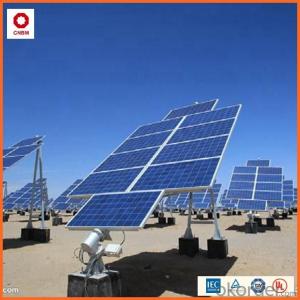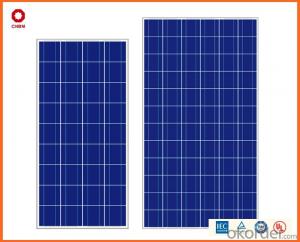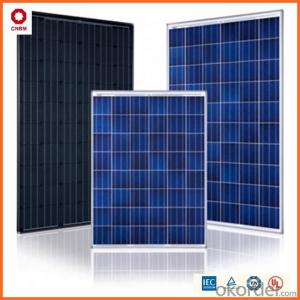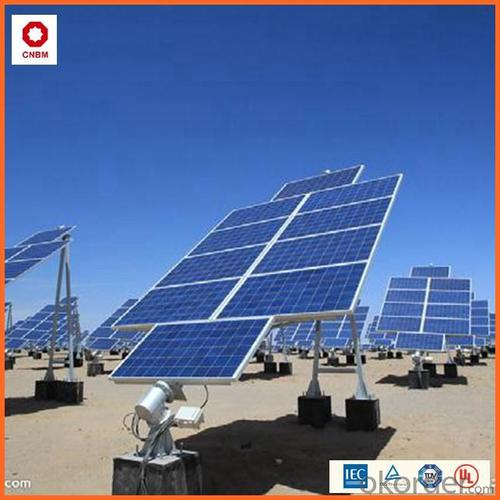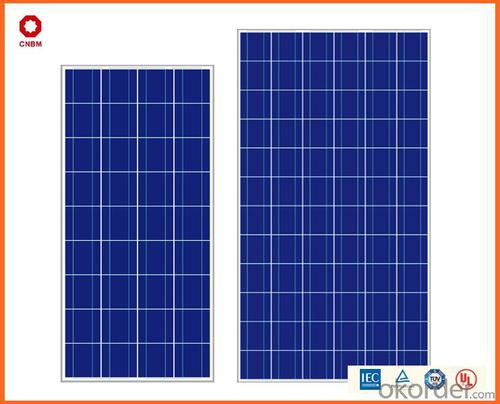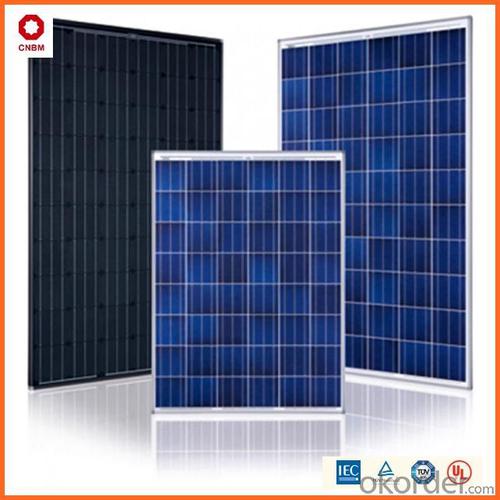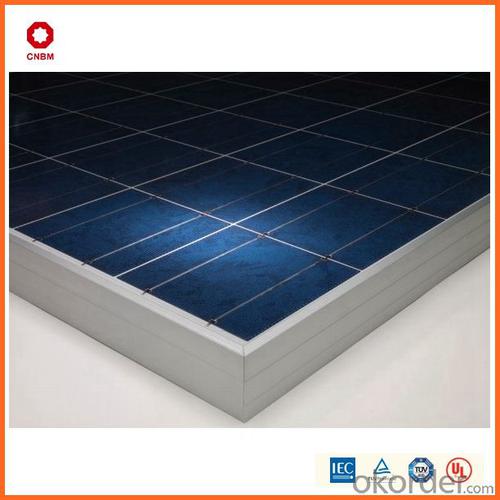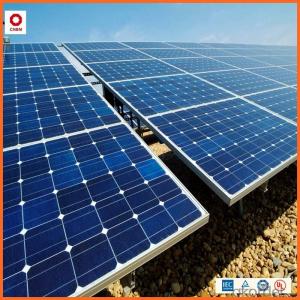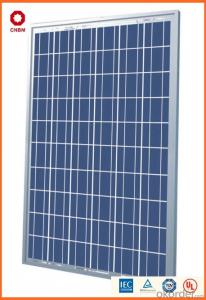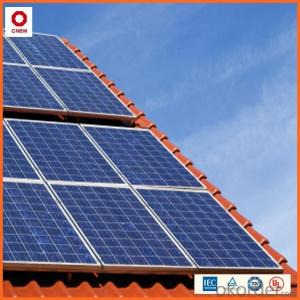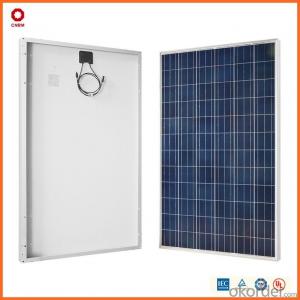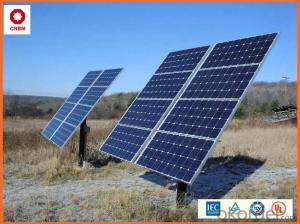Solar Energy Systems Uk - !!! Hot on Sale!!! Stock 300W Poly Solar Panel USD0.45/W A Grade Good Solar Panel On Sale
- Loading Port:
- China main port
- Payment Terms:
- TT OR LC
- Min Order Qty:
- 1 watt
- Supply Capability:
- 10000000 watt/month
OKorder Service Pledge
OKorder Financial Service
You Might Also Like
Product Description:
Hot Sale !!! Quality and Safety of 245w-320w Poly Solar Panel
1. Rigorous quality control meets the highest international standards.
2. High-transmissivity low-iron tempered glass, strong aluminium frame.
3. Using UV-resistant silicon.
4. IS09001/14001/CE/TUV/UL
Warranties of 245w-320w Poly Solar Panel
1. 10 years limited product warranty
2. 15 years at 90% of the minimal rated power output
3. 25 years at 80% of the minimal rated power output
Technical date of 245w-320w Poly Solar Panel
ITEM NO.: | Mono 125*125 cell ,36pcs . Power range from 80Wp-100Wp | ||||||||
Maximum Power(W) | 80 | 85 | 90 | 95 | 100 | ||||
Optimum Power Voltage(Vmp) | 17.81 | 17.89 | 17.94 | 17.99 | 18.06 | ||||
Optimum Operatige Current(Imp) | 4.78 | 4.91 | 5.12 | 5.35 | 5.59 | ||||
Open Circuit Voltage(Voc) | 21.98 | 22.05 | 22.14 | 22.28 | 22.45 | ||||
Short Circuit Current(Isc) | 4.95 | 5.15 | 5.36 | 5.65 | 5.84 | ||||
Solar Cell: | 125*125 Mono | ||||||||
Number of Cell(pcs) | 4*9 | ||||||||
Brand Name of Solar Cells | JA Cell, Bluesun Cell | ||||||||
Size of Module(mm) | 1580*808*35 | ||||||||
Caple & Connector Type | Pass the TUV Certificate | ||||||||
Frame(Material Corners,etc.) | Aluminium-alloy | ||||||||
Backing (Brand Type) | TPT | ||||||||
Cell Efficiency for 100W(%) | 15.8% | ||||||||
Weight Per Piece(KG) | 12.0KG | ||||||||
FF (%) | 70-76% | ||||||||
Junction Box Type | Pass the TUV Certificate | ||||||||
Tolerance Wattage(e.g.+/-5%) | ±3%, or 0-3% | ||||||||
Front Glass Thikness(mm) | 3.2 | ||||||||
Temperature Coefficients of Isc(%) | +0.04 | ||||||||
Temperature Coefficients of Voc(%) | -0.38 | ||||||||
Temperature Coefficients of Pm(%) | -0.47 | ||||||||
Temperature Coefficients of Im(%) | +0.04 | ||||||||
Temperature Coefficients of Vm(%) | -0.38 | ||||||||
Temperature Range | -40°C to +85°C | ||||||||
Surface Maximum Load Capacity | 2400Pa | ||||||||
Allowable Hail Load | 23m/s ,7.53g | ||||||||
Bypass Diode Rating(A) | 12 | ||||||||
Warranty | 90% of 10 years,80% of 25 years. | ||||||||
Standard Test Conditions | AM1.5 1000W/ 25 +/-2°C | ||||||||
Packing | carton or pallet | ||||||||
1*20' | 25 Pallets / 450pcs | ||||||||
1*40'STD | 25 Pallets / 100pcs | ||||||||
Features of our products:
• High conversion efficiency mono/poly-crystalline amorphous silicon solar cells
• Modules incorporate high performance bypass diodes to minimize the power drop caused by shading
• High transmittance, low-iron tempered glass
• High performance EVA encapsulant to prevent destroying and water.
• AI frame: without screw, corner connection. 8 holes on the frame can be installed easily
• Good performance of preventing from atrocious weather such as wind and hails
• Certifications: CE IEC TUV VDE UL, Class I
• 10 years 90% power output warranty

Shipping of 245w-320w Poly Solar Panel
By Sea | Delivery from Shanghai or Ningbo seaport |
By Air | Departure from Shanghai Pudong Airport |
By Express | Post by DHL, EMS, UPS, TNT. |
- Q: Can solar energy systems be used for powering electric vehicle solar charging stations at rest areas?
- Yes, solar energy systems can be used for powering electric vehicle solar charging stations at rest areas. Solar panels can be installed at rest areas to capture sunlight and convert it into electricity. This electricity can then be used to power the charging stations, allowing electric vehicles to charge their batteries using clean and renewable energy. Solar charging stations provide an excellent opportunity to utilize solar energy in an efficient and sustainable manner, reducing the reliance on fossil fuels and lowering carbon emissions. Additionally, solar charging stations can be integrated with energy storage systems, such as batteries, to store excess electricity generated during the day for use during the night or on cloudy days. This ensures continuous availability of charging services, even when the sun is not shining. Overall, utilizing solar energy systems for powering electric vehicle charging stations at rest areas is an environmentally friendly and economically viable solution.
- Q: Can solar panels be installed on floating platforms or structures?
- Yes, solar panels can indeed be installed on floating platforms or structures. This innovative approach is known as floating solar or floating photovoltaic (PV) systems. These systems consist of solar panels mounted on floating platforms that are placed on bodies of water such as lakes, reservoirs, or even the ocean. Floating solar panels offer several advantages over traditional ground-mounted or rooftop solar installations. Firstly, they can make use of underutilized space on water bodies, where land is limited or expensive. This can be particularly beneficial in densely populated areas or in regions with high land costs. Secondly, floating solar panels can help to reduce water evaporation from reservoirs, lakes, or other water bodies, thus conserving water resources. Additionally, the water beneath the panels can help to cool the panels, improving their overall efficiency and energy output. Furthermore, floating solar panels can be easier to install and maintain compared to ground-mounted systems. They often require less land preparation and can be deployed and relocated relatively quickly. Maintenance and cleaning of the panels can also be simpler, as they can be accessed directly from the water surface. Floating solar systems have gained popularity in recent years and have been successfully implemented in various countries around the world. They have proven to be a viable and sustainable solution for generating clean and renewable energy, while also addressing land constraints and water conservation. In conclusion, solar panels can be installed on floating platforms or structures, providing an innovative and efficient way to generate solar energy while utilizing underutilized water surfaces.
- Q: Can solar energy systems be connected to the existing power grid?
- Yes, solar energy systems can be connected to the existing power grid. This is known as grid-tied or grid-connected solar systems. In this setup, solar panels generate electricity from sunlight, which is then converted into usable AC power by inverters. This AC power is then fed into the existing power grid, supplementing the electricity supply from the utility company. Grid-tied solar systems offer several advantages. Firstly, they allow homeowners and businesses to reduce their reliance on fossil fuel-based electricity and lower their carbon footprint. Additionally, excess electricity generated by the solar panels can be sent back to the grid, resulting in net metering or feed-in tariffs, where the utility company credits the system owner for the excess power. This can lead to significant cost savings or even revenue generation. Furthermore, grid-tied systems provide a reliable and stable electricity supply. During times when the solar panels are not generating enough power, such as at night or during cloudy weather, electricity can be drawn from the grid. Conversely, when the panels produce more electricity than is being used, the excess is sent back to the grid, ensuring a continuous and uninterrupted power supply. It's important to note that the installation and connection of grid-tied solar systems may require the approval and coordination of the local utility company, as well as compliance with relevant regulations and safety standards. However, overall, the ability to connect solar energy systems to the existing power grid makes them a versatile and beneficial renewable energy solution.
- Q: What is the role of solar charge controllers in regulating the charging of batteries?
- The role of solar charge controllers is to regulate the charging of batteries by managing the flow of electricity from the solar panels to the batteries. They ensure that the batteries are charged efficiently and safely by monitoring the voltage and current levels, and adjusting the charging parameters accordingly. This prevents overcharging, which can damage the batteries, and also protects against over-discharging, which can shorten their lifespan. Solar charge controllers act as a crucial intermediary between the solar panels and batteries, optimizing the charging process to maximize the battery's performance and longevity.
- Q: Can solar energy systems be used for heating water in commercial buildings?
- Yes, solar energy systems can be effectively used for heating water in commercial buildings. Solar water heating systems use the sun's energy to heat water, which can then be used for various purposes in commercial buildings such as showers, sinks, and other hot water needs. These systems are cost-effective, environmentally friendly, and can significantly reduce the reliance on traditional fossil fuel-based heating methods.
- Q: Can solar energy systems be used in areas with high levels of bird activity?
- Yes, solar energy systems can be used in areas with high levels of bird activity. However, precautions should be taken to minimize any potential negative impact on birds. This can be achieved by implementing bird-friendly designs and techniques such as using mesh screens or netting, angling solar panels to reduce reflection, and avoiding installation near nesting sites or migration routes. Regular monitoring and maintenance can also help identify and address any issues that may arise.
- Q: What are the different financing options for solar energy systems?
- There are several financing options available for solar energy systems, including cash purchases, solar loans, solar leases, power purchase agreements (PPAs), and property assessed clean energy (PACE) financing. Cash purchases involve paying the full cost of the system upfront. Solar loans allow homeowners to borrow money to finance the system and pay it back over time with interest. Solar leases involve leasing the system from a third-party provider and paying a fixed monthly fee. PPAs allow homeowners to purchase the electricity generated by the system at a predetermined rate. PACE financing allows homeowners to finance the system through an additional assessment on their property taxes.
- Q: Can solar energy systems be used for powering military or defense installations?
- Yes, solar energy systems can definitely be used for powering military or defense installations. In fact, many military and defense organizations around the world are increasingly adopting solar energy systems as a reliable and sustainable source of power for their operations. There are several reasons why solar energy systems are suitable for military and defense installations. Firstly, solar power is a renewable energy source that is abundant and widely available. This means that military installations located in remote or off-grid areas can still have access to electricity without relying on traditional fossil fuel-based generators, which can be expensive and logistically challenging to transport and maintain. Secondly, solar energy systems offer a decentralized power supply option. This means that military installations can become less reliant on vulnerable and centralized power grids, reducing their susceptibility to power outages or attacks on critical infrastructure. Solar panels can be installed on rooftops, parking lots, or unused land within the military base, making effective use of available space. Furthermore, solar energy systems require minimal maintenance compared to traditional power generation methods. This is particularly advantageous for military or defense installations located in remote or hostile environments, where regular maintenance and fuel supply for generators may be difficult or risky. Solar panels are durable and have a long lifespan, requiring only periodic cleaning and routine inspections. In addition to their reliability and resilience, solar energy systems also offer economic benefits. By reducing reliance on fossil fuels, military installations can lower their operational costs and potentially save significant amounts of money in the long run. The funds saved can then be allocated to other critical defense needs or used for research and development of advanced military technologies. Moreover, deploying solar energy systems for military installations aligns with the global trend towards clean and sustainable energy solutions. It demonstrates a commitment to reducing greenhouse gas emissions and mitigating the impact of climate change, contributing to the overall sustainability goals of military organizations. Overall, solar energy systems are a viable and practical option for powering military or defense installations. They offer reliability, resilience, cost savings, and environmental benefits, making them an attractive choice for military organizations seeking to optimize their energy supply and reduce their carbon footprint.
- Q: Can solar energy systems be easily expanded or upgraded?
- Yes, solar energy systems can be easily expanded or upgraded. The modular nature of solar panels allows for additional panels to be added to the system, increasing its capacity. Similarly, if more energy is required, additional batteries can be installed to store excess energy. Furthermore, advancements in technology and increasing efficiency of solar panels make it possible to upgrade existing systems with new and more efficient components, improving overall performance.
- Q: Are there any risks of electrical malfunctions or failures during extreme weather events with solar energy systems?
- Yes, there are some risks of electrical malfunctions or failures during extreme weather events with solar energy systems. While solar panels are designed to withstand various weather conditions, including rain, snow, and wind, they may still be vulnerable to damage in extreme weather events such as hurricanes, tornadoes, or severe storms. High winds can potentially cause physical damage to the solar panels, including dislodging them from their mounts or breaking them entirely. Heavy snowfall can also cover the panels, reducing their efficiency and potentially causing them to collapse under the weight. Additionally, lightning strikes during thunderstorms can pose a risk to the electrical components of the solar energy system, potentially leading to malfunction or failure. However, it is worth noting that solar energy systems are typically built with safety measures in place to minimize these risks. Many solar panels are tested and certified to withstand specific wind speeds and snow loads. Mounting systems are designed to be sturdy and secure, and electrical components often have surge protection to guard against lightning strikes. Moreover, solar energy systems are interconnected with the power grid, allowing for a seamless transition to grid power during extreme weather events if necessary. This can help mitigate the impact of potential malfunctions or failures. To reduce the risks associated with extreme weather events, it is important for solar energy system owners to regularly maintain and inspect their systems. Periodic check-ups and cleaning can help ensure that the panels are in good condition, and any signs of damage or wear can be addressed promptly. It is also advisable to consult with a professional installer or technician who can provide guidance on specific weather-related risks and potential solutions.
Send your message to us
Solar Energy Systems Uk - !!! Hot on Sale!!! Stock 300W Poly Solar Panel USD0.45/W A Grade Good Solar Panel On Sale
- Loading Port:
- China main port
- Payment Terms:
- TT OR LC
- Min Order Qty:
- 1 watt
- Supply Capability:
- 10000000 watt/month
OKorder Service Pledge
OKorder Financial Service
Similar products
Hot products
Hot Searches
Related keywords
